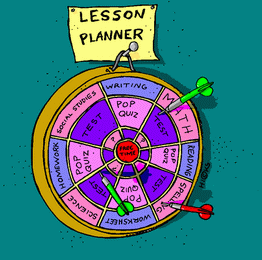From Myers and the "Effective Use of Field Trips" I learned the three steps to making sure a field trip runs smoothly: pre-trip planning, trip and post trip. By working out the logistics and talking to administration and parents in the pre-trip planning, it will make it run smoother. I will also tell them what I expect the students to get out of the trip. During the trip, I will provide students with an agenda and objectives -- this will decrease students frustration and maximize student learning. To bring the experience full circle I will discuss the field trip in the post phase of planning. This will allow students to analyze their experience during the field trip. As an agricultural educator, field trips are very important to allow the student to see that what they are learning in class, will be beneficial to them in the long run. It is also a good way to provide real life experiences in a classroom.
Cooperative learning is very beneficial to classrooms at appropriate times. By having the students work together and having to explain information to each other it increases understanding. Cooperative learning also works on life skills such as listening to others, taking turns, contributing ideas, explaining oneself clearly and encouraging others. These all sound like skills that students should have learned in elementary school, but it is always a good idea to drive those skills home. These skills are what employers are going to be looking for.
 |
| Cooperative Learning http://teachers.henrico.k12.va.us/staffdev/mcdonald_j/downloads/21st/comm/BenefitsOfCL/OverviewOfCoopLrng_Benefits.html |
There are many ways teachers can ask a question, but the key to success is doing it effectively. There are many different paths a teacher could go down, specific vs broad contents, asked to the general crowd or a direct person at a low or high cognitive level. I thought it was interesting that the reading suggested to not develop patterns while asking questions because then students will catch on and only listen when they think that they are going to have a question directed at them. By switching it up it makes the students have to pay attention at all times because they do not know when they will get called on. Questions are a good way to check for student comprehension as well. By watching to see how many people raise their hands to answer certain questions, it shows the teacher what they need to spend more time on and maybe even revert back to subject matter already taught. It is always important to work at the students pace, because that is the whole point of school -- for students to learn. I can check comprehension as well if a students gives an answer that skims the surface, I can probe them to make them think more deeply about the question and maybe come up with a better answer. I need to watch my class to see their facial expressions, to learn about their thoughts and opinions on the lesson. If they look confused, I will have to clarify, if they look bored, I will have to try to be more exciting. It is about the students, and I need to fix my class in a way that it maximizes student potential.




.jpg)

